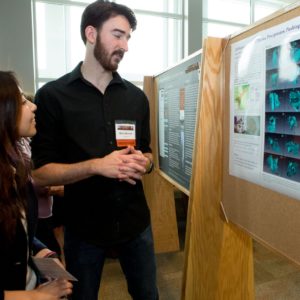Last year, I was invited to be a judge for Princeton Research Day (PRD) as a veteran of the Mary W. George Freshman Research Conference. If there was one thing I loved about this conference, it was hearing my peers’ interesting research conclusions. I was excited to see this happen on an even larger scale at PRD, but I was also nervous; I felt that I had little authority to judge the work of upperclassmen (and graduate students!) with only a semester’s worth of experience under my belt. However, the event organizers were incredibly encouraging in this respect, valuing our nonspecialist input.

Before PRD, the judges held a brief meeting to go over logistics and judging criteria. I felt that, rather than encouraging harsh criticism, the criteria really emphasized the purpose of PRD as a celebration and opportunity to share the hard work done by Princeton researchers. Scores were mostly based on how well people could relay information, translate their complex findings (no chart goes unexplained!), and engage an audience that has no experience in their field. This criteria eased a lot of my apprehension: I might not be able to judge the correctness of a data set, or rebut conclusions about culture in Georgian England, but I can judge how well these were communicated to me.
As I walked around with my judging pin and score sheet, I realized that the best approach to properly critiquing the presentations was to be a student more than a judge. I decided to indulge in my curiosity about my peers’ work, see how much of their research I could absorb, and base my judging on my ultimate understanding of their projects. I was genuinely enthusiastic about this because the presentations were interesting and wonderfully diverse, ranging from exploring sea lion stranding factors in California, to new methods in searching for black holes in dwarf galaxies.
Being a judge for PRD was the best way for me to appreciate research culture on campus. Often we’ll hear about the trials and tribulations of the process, but judging was the first time I was able to be a part of celebrating the results. Because I didn’t have much research experience going in, I could barely imagine myself doing independent work let alone critiquing it. However, the PRD presentations inspired me to, once the time comes around, find a research topic that I am compelled to share with my peers.
~~~~~
Are you a Princeton Freshman or Sophomore interested in being a judge for Princeton Research Day 2017? Send an email to researchday@princeton.edu to receive more information and sign up by Thursday, May 4th!

